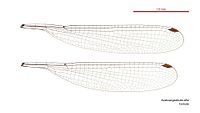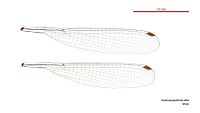Austroargiolestes elke
Appearance
(Redirected from Azure flatwing)
| Azure flatwing | |
|---|---|

| |
| Adult female | |
| Scientific classification | |
| Domain: | Eukaryota |
| Kingdom: | Animalia |
| Phylum: | Arthropoda |
| Class: | Insecta |
| Order: | Odonata |
| Suborder: | Zygoptera |
| Family: | Argiolestidae |
| Genus: | Austroargiolestes |
| Species: | A. elke
|
| Binomial name | |
| Austroargiolestes elke Theischinger & O'Farrell, 1986[2]
| |

| |
Austroargiolestes elke is a species of Australian damselfly in the family Argiolestidae,[3] commonly known as an azure flatwing.[4] It is endemic to the vicinity of Eungella National Park in north-central Queensland, where it inhabits streams in rainforests.[5]
Austroargiolestes elke is a medium-sized to large, black and blue damselfly, with strong pruinescence on adult bodies.[4] Like other members of the family Argiolestidae, it rests with its wings outspread.[6]
Gallery
[edit]-
Female wings
-
Male wings
See also
[edit]References
[edit]- ^ Dow, R.A. (2017). "Austroargiolestes elke". IUCN Red List of Threatened Species. 2017: e.T87531963A87533996. doi:10.2305/IUCN.UK.2017-1.RLTS.T87531963A87533996.en. Retrieved 19 November 2021.
- ^ Theischinger, G.; O'Farrell, A.F. (1986). "The genus Austroargiolestes Kennedy (Zygoptera: Megapodagrionidae)". Odonatologica. 15 (4): 387–428 [396].
- ^ "Species Austroargiolestes elke Theischinger & O'Farrell, 1986". Australian Faunal Directory. Australian Biological Resources Study. 2022. Retrieved 1 November 2024.
- ^ a b Theischinger, Günther; Hawking, John (2006). The Complete Field Guide to Dragonflies of Australia. Collingwood, Victoria, Australia: CSIRO Publishing. p. 56. ISBN 978-0-64309-073-6.
- ^ Theischinger, Gunther; Endersby, Ian (2009). Identification Guide to the Australian Odonata (PDF). Department of Environment, Climate Change and Water NSW. p. 199. ISBN 978-1-74232-475-3.
- ^ Watson, J.A.L.; Theischinger, G.; Abbey, H.M. (1991). The Australian Dragonflies: A Guide to the Identification, Distributions and Habitats of Australian Odonata. Melbourne: CSIRO. ISBN 0643051368.
External links
[edit] Media related to Austroargiolestes elke at Wikimedia Commons
Media related to Austroargiolestes elke at Wikimedia Commons



